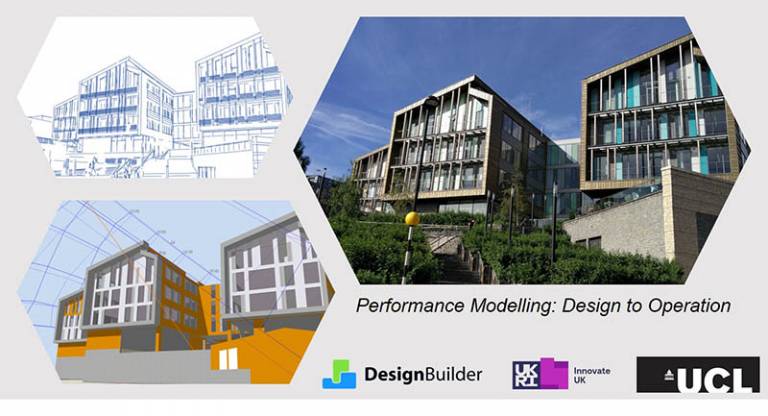DesignBuilder joins forces with UCL to lead the way in building performance assessment and modelling
DesignBuilder Software is drawing on UCL’s specialist expertise to help organisations reduce their environmental impact with new ‘in-use’ performance evaluation tools for buildings.

18 October 2021
DesignBuilder Software specialises in high-productivity simulation software that helps organisations design high-performance buildings. In particular, their tools help to minimise the environmental impact of buildings, while still ensuring buildings are pleasant and comfortable to use.
Building designers and analysts have traditionally used software like this to assess the performance of new buildings. But given the growing need to improve the performance of existing stock too, DesignBuilder was keen to include ‘in-use’ assessment tools in their software. Adding this extra functionality would mean customers could undertake energy efficiency, thermal comfort, and a range of other assessments for all their buildings, no matter their age.
“This is a relatively new area in building performance simulation software,” explains Knowledge Transfer Partnership Associate Nishesh Jain. “Not many companies are offering a holistic package for ‘in-use’ assessments such as this one, so having access to UCL’s expertise is enabling DesignBuilder to gain an important lead in their market.”
Accessing specialist university expertise
DesignBuilder is currently working with UCL on a Knowledge Transfer Partnership (KTP), tapping into expertise and research from UCL’s Institute for Environmental Design & Engineering. The academic team at UCL are providing technical know-how and case studies, to ensure DesignBuilder’s new product is based on the latest insights into in-use building performance assessment.
Director of DesignBuilder David Cocking explains: “Our vision is to help our customers significantly reduce the impact of their buildings on the planet while maximising occupant wellbeing. Our partnership with UCL has given us the technical expertise and knowledge to develop these innovative new tools, placing DesignBuilder at the forefront of research in this emerging field.”
A mutually-beneficial relationship
Dejan Mumovic, Professor of Building Performance Analysis, and Director of UCL’s Institute for Environmental Design and Engineering was the lead academic in the KTP. Dr Esfandiar Burman was the supervisor.
Dejan was keen to underline the mutually-beneficial aspects of the partnership: “While we’re supporting DesignBuilder with their business expansion and growth, this partnership is also allowing us to demonstrate the practical application of our research into the operational performance of buildings. The new DesignBuilder software tools are already being used as part of our teaching and have also formed part of research published in several journal articles and conference papers.”
Bridging the gap
As the Associate on the KTP, Nishesh has been there as the ‘bridge’ between the company and university. Having undertaken a PhD at UCL in the operational performance assessments of buildings, he’s been central to the technical side of the project. He’s also supported the company with training, webinars, marketing, and shaping technical memoranda to help disseminate best practice in the field.
“As the Associate, I’ve had the chance to get involved in research that bridges the gap between academia and industry. That is a big driver for me as it provides real world context to my academic work,” said Nishesh.
“The KTP team at UCL Innovation & Enterprise have been very helpful in the project’s success. They handle all the administrative requirements to ensure that me (as the Associate) and my academic team can focus on the technical and research aspects.”
Future links
The latest version of DesignBuilder included some of this functionality, and has already been well received in the market. Additional functionality to further improve DesignBuilder’s calibration, measurement and verification capabilities are also under development, to be released with future versions.
David added: “For us, this has been a highly valuable collaboration, and it's significantly accelerated our development of these cutting-edge tools. We’re keen to continue our work with UCL and are currently exploring possibilities beyond the KTP.”
The Knowledge Transfer Network (KTN) facilitated the project on behalf of Innovate UK. Mark Matchett, Knowledge Transfer Advisor, added: “Within the Innovate UK grant funding portfolio, the KTP programme is fairly niche but hugely significant in projects such as this. DesignBuilder recognised there was significant value for them in grasping a fundamental understanding of how to evaluate and simulate the operational performance of existing buildings, but that this was beyond their capabilities. They quickly identified that the requisite expertise and research lay mainly in academia. In this context, the KTP was the perfect vehicle to transfer this expertise to their business.”
Find out more about Nishesh’s experience as a KTP Associate with DesignBuilder.
Knowledge Transfer Partnerships
Knowledge Transfer Partnerships (KTPs) aim to help businesses improve their competitiveness and productivity through better use of the knowledge, technology and skills held within the UK knowledge base. This KTP project received financial support from UKRI through Innovate UK and the Engineering and Physical Sciences Research Council (EPSRC).
Links
Find out more about:
- UCL Institute for Environmental Design and Engineering
- For businesses - working on a Knowledge Transfer Partnerships (KTP) with UCL
- For UCL staff - Transform businesses through a Knowledge Transfer Partnership (KTP)
- Search for a KTP Associate role
- Nishesh winning the CIBSE Building Simulation Young Modeller Award 2021
- Innovate UK
- EPSRC
- KTN
Photo © DesignBuilder
 Close
Close

